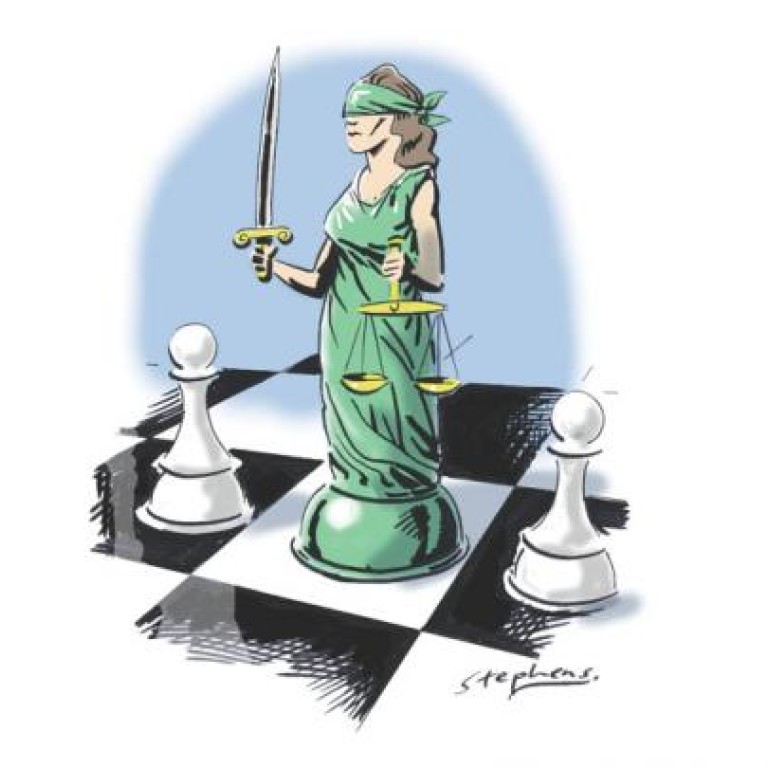
Politics before justice for Bo Xilai, Chen Kegui
Jerome A. Cohen says although different in every way, Bo Xilai and Chen Kegui both share the uncertain fate of being tried by a Chinese legal system that places politics above justice
Despite next week's 18th Communist Party congress, attention inside and outside China is increasingly riveted on the forthcoming criminal prosecution of Bo Xilai , the deposed leader whose case has already done so much to upset the party's carefully scripted plans for an orderly transfer of national power.
Virtually out of sight, by contrast, is another political prosecution - that of an ordinary farmer named Chen Kegui. He led an uncontroversial life until his uncle, the blind "barefoot lawyer" Chen Guangcheng, escaped from illegal confinement in their village in late April, straining China's relations with the United States.
The charges for which Bo and Chen Kegui have been investigated are very different. Bo is allegedly implicated in his wife's murder of Englishman Neil Heywood as well as in other offences including corruption. Chen is being held for having stabbed a local official in an effort to protect himself and his family. Thirty-odd police officers and thugs, infuriated by his uncle's escape, had illegally forced their way into the family farmhouse after midnight on April 27 without search or arrest warrants and, while beating and wounding Chen and his family, threatened to kill him.
Although the two suspects hail from opposite ends of China's political, economic and social hierarchies, they now have much in common, including the determination of the authorities to punish them for political reasons.
Both cases are shrouded in mystery. Each suspect has been held incommunicado for many months during investigation, Bo by the party's secretive Central Commission for Discipline Inspection controlled by the leaders who deposed him, and Chen by the same rural public security bureau that had persecuted and confined his uncle for many years. Both cases have now been transferred to the procuracy, which is purportedly reviewing the evidence before deciding whether to prosecute the suspects and for what crimes.
No relatives or friends have been allowed contact with either suspect. More importantly, neither has been permitted a lawyer of his choice, in clear violation of China's 2007 Lawyers Law. Although Bo's family has retained able defence counsel, the authorities have not yet acknowledged them. In Chen's case, the authorities have rejected the experienced human rights lawyers selected by his family and instead appointed two local lawyers, obviously operating under government instruction. They at first maintained they had been authorised by Chen's father. When that lie was exposed, they said they were authorised by Chen himself, a claim that cannot be verified since no outsider has access to him.
The same thing happened to Chen Guangcheng when in 2006 he was sentenced to more than four years' imprisonment by the same local authorities after two farcical trials. They assaulted lawyers chosen by his family and forced him to accept lawyers from the same firms that have now been appointed to defend his nephew.
The county procuracy refuses to discuss the nephew's plight with the lawyers his family has retained. It should be investigating their illegal exclusion from the case as well as the illegal police-sponsored raid on the Chen family home.
The police may have staved off such investigation by making token compensation to Chen Kegui's family for property damaged in the raid and by punishing one of their thuggish "police assistants" with five days of administrative detention for inflicting the damage. Although this constituted implicit, if limited, recognition of their misconduct during the raid, the police have refused to reveal the legal basis for the raid itself.
The family's lawyers has sought a court order requiring the police to respond. Of course, since the central government has failed to fulfill its promise to investigate the many official abuses against Chen Kegui's uncle and his family, one cannot expect more from the county government that committed them.
Neither Bo nor Chen can be put on trial before indictment. Yet indictment is not in doubt in either case. In China, prosecutors almost always follow the recommendation of the party or the police, just as courts overwhelmingly approve prosecution charges. The actions of all three institutions are "co-ordinated" by the local party political-legal commission.
If prosecutors insist on prosecution, they should at least provide Chen with a change of venue so that his trial is not handled by a court controlled by the same political-legal commission that controls the police and procuracy bringing this case. Bo will certainly not be tried in Chongqing, where some of his alleged crimes were committed, just as his wife was not tried there for murder. Party defendants are often tried in another place to foster the appearance of an impartial tribunal. Chen Kegui should receive the same treatment.
If Chen's case could be decided by an impartial court, he would very likely be acquitted, even without helpful lawyers, because he obviously acted in self-defence against a lawless, life-threatening attack. Although he did not inflict very serious injury on the wounded official, his case bears strong resemblance to that of Deng Yujiao, who stabbed to death one of three officials attempting to rape her. The authorities originally contemplated a murder charge, but, thanks to a clever lawyer who stoked the fires of public opinion via the media and internet, they only convicted her of assault, and then found excuses to promptly release her.
Chen, although plainly not guilty, may have to settle for a similar fate, since law enforcement officials are keenly aware that a not-guilty verdict would more readily expose them to a successful lawsuit for false arrest and damages.
Bo, whose problems are far more severe, undoubtedly wishes he could plausibly claim self-defence.

